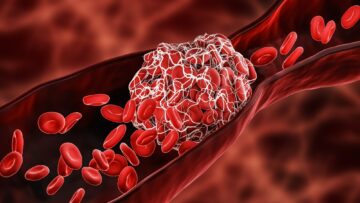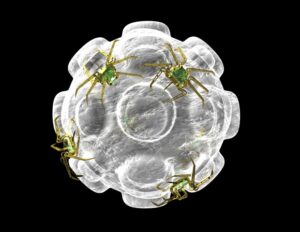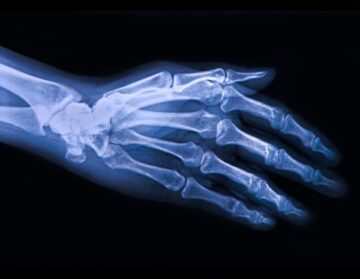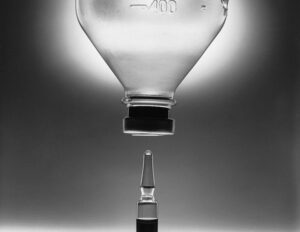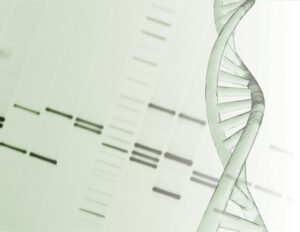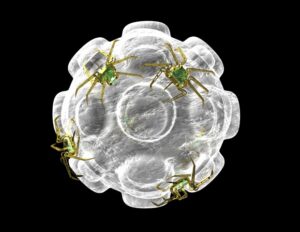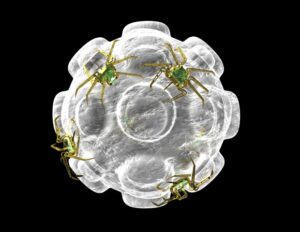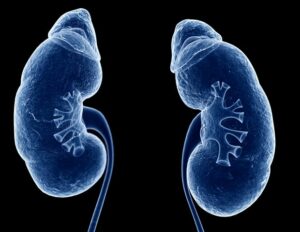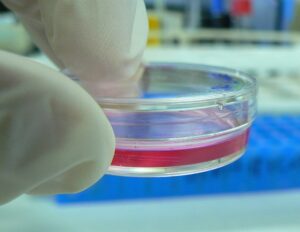The ongoing coronavirus disease 2019 (COVID-19) pandemic, which is caused by the severe acute respiratory syndrome coronavirus 2 (SARS-CoV-2), has claimed more than 6.89 million lives worldwide.
The rapid deployment of COVID-19 vaccines has prevented an estimated 14 million deaths in the first year of its administration. Following the emergence of new SARS-CoV-2 variants, the efficacy of existing COVID-19 vaccines has reduced.
 Study: A ferritin-based COVID-19 nanoparticle vaccine that elicits robust, durable, broad-spectrum neutralizing antisera in non-human primates. Image Credit: Marian Weyo / Shutterstock.com
Study: A ferritin-based COVID-19 nanoparticle vaccine that elicits robust, durable, broad-spectrum neutralizing antisera in non-human primates. Image Credit: Marian Weyo / Shutterstock.com
The limitations of current COVID-19 vaccines
In May 2022, the World Health Organization (WHO) estimated that about one billion individuals globally have remained unvaccinated against COVID-19. The affordability issue of the COVID-19 vaccine has significantly limited mass vaccination, as most available vaccines require low-temperature storage and transportation that increase the cost of vaccine programs.
The lack of durable immune protection after COVID-19 vaccination or natural infection has also prevented the eradication of SARS-CoV-2. Furthermore, the emergence of SARS-CoV-2 variants of concern (VOCs) that can evade immune protection elicited either through vaccination or natural infection have resulted in a continual increase in infections globally.
The S∆C-Fer COVID-19 vaccine
Previous studies have indicated that nanotechnology-based protein vaccines are more readily available to antigen-presenting dendritic cells. The multivalent presentation of the antigen facilitated by the nanoparticles enhances receptor clustering and B-cell activation.
Ferritin-based nanoparticle vaccines are associated with strong humoral immune responses against SARS-CoV-2, as well as significant efficacy and safety profiles. One protein nanoparticle-based vaccine, S∆C-Fer, contains an inactivated polybasic cleavage site that has been shown to improve neutralizing titers. Notably, S∆C-Fer also consists of the 2-proline (2P) prefusion-stabilizing substitutions that were present in the United States Food and Drug Administration (FDA)-approved COVID-19 messenger ribonucleic acid (mRNA) vaccines.
The S∆C-Fer vaccine candidate also contains a deletion of 70 amino acid residues from the C-terminus of the spike ectodomain. This deletion enabled the removal of a highly flexible region that contained immunodominant linear epitopes.
In comparison to other tested vaccines in mice models, this modified spike protein on a ferritin nanoparticle revealed a significantly better neutralizing capacity of the induced antisera.
About the study
A recent Nature Communications study introduced the updated version of S∆C-Fer, which has been called Delta-C70-Ferritin-HexaPro (DCFHP). The previously present 2P stabilizing substitutions were supplemented with four proline substitutions to develop a six-proline substituted (HexaPro) form of the vaccine.
DCFHP can be produced in a Chinese hamster ovary (CHO) cell line. DCFHP was found to be more stable to thermal denaturation than S∆C-Fer.
This nano-based COVID-19 vaccine contains DCFHP-alum, in which the DCFHP antigen was developed with aluminum hydroxide (alum). The aluminum salt adjuvant is a commonly used adjuvant in human vaccines that has received approval from the FDA and other global regulatory bodies. Importantly, alum has also been used in infant vaccines against diphtheria-tetanus-pertussis (DTaP), hepatitis B, and Haemophilus influenzae type b (Hib) and is associated an exceptional safety profile.
Study findings
DCFHP-alum was found to induce a robust and durable immune response in mice against SARS-CoV-2 VOCs. Importantly, this vaccine candidate also remained stable in wide-ranging temperatures from 4°C to 37°C for at least 14 days.
The low projected cost, high-scale production, and broad-spectrum antibody response make DCFHP-alum a desirable COVID-19 vaccine alternative. Thousands of DCFHP vaccine doses per liter of engineered CHO-K1 cell culture could be produced if a vaccine dose of less than 100 micrograms and a purification yield of 10% or more were obtained.
Rhesus macaques subjected to two intramuscular doses of DCFHP-alum produced durable, robust, and broadly neutralizing antibodies. These antibodies were highly effective against SARS-CoV-2 VOCs, such as the Omicron subvariants BA.4/5 and BQ, and induced a balanced Th1 and Th2 immune response. Importantly, these antibody responses persisted for more than 250 days.
Non-human primate (NHPs) antisera exhibited strong and persistent neutralization activity against SARS-CoV-1 pseudovirus. NHPs also received a booster dose of DCFHP-alum after one year, which produced a robust, wide-spectrum, and anamnestic neutralizing antibody response.
Conclusions
The newly developed DCFHP-alum COVID-19 vaccine candidate was found to be affordable and effective for mass vaccination. Based on experimental results, a less frequent booster vaccination schedule of once yearly would provide effective, robust, and persistent antibodies against the SARS-CoV-2 ancestral strain, as well as its variants.
If the NHP results are reproduced in clinical trials, DCFHP-alum could be used as a booster vaccine in individuals who were vaccinated with different SARS-CoV-2 vaccines. This vaccine candidate would also remain effective in unvaccinated individuals with a history of COVID-19.
- Weidenbacher, P. A., Sanyal, M., Friendland, N., et al. (2023) A ferritin-based COVID-19 nanoparticle vaccine that elicits robust, durable, broad-spectrum neutralizing antisera in non-human primates. Nature Communications, 14, 2149. doi:10.1038/s41467-023-37417-9
- SEO Powered Content & PR Distribution. Get Amplified Today.
- Platoblockchain. Web3 Metaverse Intelligence. Knowledge Amplified. Access Here.
- Minting the Future w Adryenn Ashley. Access Here.
- Source: https://www.news-medical.net/news/20230418/New-DCFHP-alum-COVID-19-vaccine-candidate-shows-durable-broad-spectrum-protection-in-non-human-primates.aspx
- :has
- :is
- ][p
- 10
- 100
- 2019
- 2022
- 2023
- 66
- 70
- a
- About
- Activation
- activity
- administration
- affordable
- After
- against
- AL
- alternative
- and
- Antibodies
- approval
- ARE
- AS
- associated
- At
- available
- based
- BE
- been
- Better
- Billion
- broadly
- by
- CAN
- candidate
- Capacity
- caused
- Cells
- chinese
- claimed
- Clinical
- clinical trials
- clustering
- commonly
- Communications
- comparison
- Concern
- contains
- Coronavirus
- Cost
- could
- COVID-19
- credit
- Culture
- Current
- Days
- deaths
- deployment
- develop
- developed
- different
- Disease
- drug
- Effective
- either
- emergence
- enabled
- Enhances
- estimated
- exceptional
- existing
- facilitated
- fda
- First
- flexible
- following
- food
- Food and Drug Administration
- For
- form
- found
- four
- frequent
- from
- Furthermore
- Global
- Globally
- Hamster
- Have
- Health
- height
- highly
- history
- HTTPS
- human
- image
- improve
- in
- Increase
- indicated
- individuals
- infection
- Infections
- introduced
- issue
- ITS
- jpg
- Lack
- limitations
- Limited
- Line
- Lives
- Low
- make
- Mass
- May..
- Messenger
- mice
- million
- models
- modified
- more
- most
- mRNA
- Natural
- Nature
- New
- notably
- obtained
- of
- on
- ONE
- ongoing
- organization
- Other
- Ovary
- pandemic
- plato
- Plato Data Intelligence
- PlatoData
- present
- presentation
- previously
- Produced
- Production
- Profile
- Profiles
- Programs
- projected
- protection
- Protein
- provide
- rapid
- received
- Reduced
- region
- regulatory
- remain
- remained
- removal
- require
- response
- Results
- Revealed
- robust
- Safety
- salt
- SARS-CoV-2
- schedule
- severe
- shown
- Shows
- shutterstock
- significant
- significantly
- site
- Sources
- spike
- stable
- States
- storage
- strong
- studies
- Study
- such
- that
- The
- the world
- thermal
- These
- thousands
- Through
- thumbnail
- to
- transportation
- trials
- United
- United States
- updated
- URL
- used
- Vaccine
- vaccines
- version
- WELL
- which
- WHO
- with
- world
- World Health Organization
- worldwide
- would
- year
- Yield
- zephyrnet


